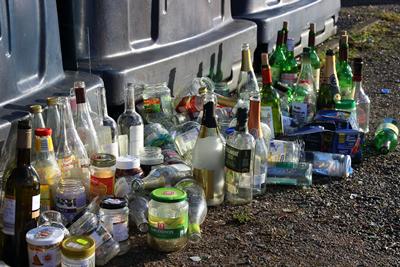Glass bottles amongst the most environmentally impactful says Southampton study

Research by environmental experts at the University of Southampton has determined that glass bottles are likely to be more environmentally impactful containers for pre-packaged drinks than plastic bottles.
Also, Tetra Pak-style fruit juice cartons, current milk cartons and 100% aluminium cans are actually amongst the most environmentally-friendly.
The life-cycle assessment of drinks containers, conducted by Southampton postgraduate researcher Alice Brock, together with Ian Williams, Professor of Applied Environmental Science, found many, more suitable alternatives to plastic bottles for pre-packaged drinks. The findings are published in Detritus, the Journal for Waste Resources and Residues.
As different beverages have different packaging needs, commonly used containers for milk, fruit juice and pressurised ‘fizzy’ drinks were studied including glass bottles, aluminium cans, milk cartons (including Tetra Pak), PET bottles (made of polyethylene terephthalate) and HDPE bottles (made of high-density polythene).
The results demonstrate that in each category, there is a more environmentally-friendly packaging alternative to plastic bottles with glass bottles - made of both virgin materials and a hypothetical ‘100%’ recycled bottle - actually found to be considerably more environmentally impactful than plastic bottles.
PET plastic bottles proved to be more environmentally-impactful than HDPE plastic bottles overall ad for pressurised drinks, 100% aluminium cans came through as the least impactful option with regular aluminium cans also less impactful than glass or plastic.
For fruit drinks, Tetra Pak-style cartons would be the least impactful option and current milk cartons were found to be the least impactful for milk (milk cartons differ from Tetra Pak as they do not contain aluminium).
Even though the study demonstrated that glass and recycled glass bottles are more impactful on the environment than all other containers, the researchers determined that all of them have environmental impacts across a broad spectrum of categories, from their global warming potential (GWP100) to their potential to deplete fossil fuels.
“All beverage packaging that we assessed showed some form of environmental impacts and both the milk carton and Tetra Pak, despite being less impactful than the plastic bottles still contain plastic elements,” said Alice Brock, “Based on the evidence, society needs to move away from single-use beverage packaging in order to reduce environmental harm and embrace the regular everyday use of reusable containers as standard practice.
“There should be a move towards reusable beverage packaging to reduce environmental impacts and encourage more sustainable lifestyles,” she added. “Changes in infrastructure and potential incentives to use reusable packaging should be implemented and policies such as the proposed coffee cup tax should be adapted for single use beverage packaging.”
Professor Williams said: “Global plastic production has increased annually since World War II and is currently at least 380 million tonnes. Plastic drinks packaging is ubiquitous with over 13 billion plastic bottles used per year in the United Kingdom alone with global concern about pollution from plastics in the seas and the environmental costs of plastics manufacture is rising.
“We hope our study will help inform public and commercial debate over the suitability of some times of packaging that we all use in our daily lives,” he continued, “and lead to swift and decisive changes in the drinks industry to find more environmentally-friendly alternatives as a matter of some urgency.”
The paper Life Cycle Assessment of Beverage Packaging (DOI 10.31025/2611-4135/2020.14025) is published in Detritus.